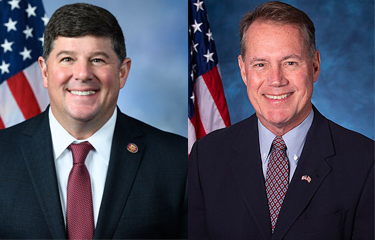Palazzo, Case file latest version of AQUAA Act in US House of Representatives

A push to expand offshore aquaculture in the United States garnered more support on Tuesday, 14 December with the refiling of the Advancing the Quality and Understanding of American Aquaculture (AQUAA) Act.
U.S. Rep. Stephen Palazzo (R-Mississippi) and U.S. Rep. Edward Case (D-Hawaii) are the sponsors behind the House version of the bill. Their bill would create a national framework for aquaculture developments and streamline the regulatory process needed to approve such projects.
A Senate version of the bill was filed on 28 October, led by U.S. Sens. Roger Wicker (R-Mississippi), Marco Rubio (R-Florida), and Brian Schatz (D-Hawaii). Wicker has filed similar bills in the previous two sessions of Congress, as did Palazzo and former U.S. Rep. Collin Peterson (D-Minnesota).
In a statement, Palazzo said that America suffers from an overreliance on imports to meet the country’s seafood needs.
“Coastal states and communities, like South Mississippi, enjoy a benefit of knowing where their seafood comes from when they order at a local restaurant,” he said. “Many other states throughout our nation aren’t so lucky.”
The bill would allow developments in the country’s exclusive economic zone, which is second only to France in terms of size. Despite that, the U.S. ranked 17th globally in 2018 in terms of aquaculture production, according to data from NOAA Fisheries.
Case noted that Hawaii and other states have had success permitting fish farms in state waters, but “confusing and often contradicting” regulations from numerous federal agencies has stymied similar efforts in federal waters.
“Our bipartisan, bicameral AQUAA Act would provide a consistent efficient regulatory umbrella to help fully unlock the potential of open ocean aquaculture in a sustainable, environmentally-sensitive, and science-based way and grow economies for coastal states and food security for the nation,” Case said in a statement.
Critics of the legislation have expressed fear that expanding aquaculture could threaten wild-catch fisheries and the environment by polluting waters nearby fish farms and reducing the areas where boats can harvest fish.
Sara Brenholt, campaign manager for pro-aquaculture group Stronger America Through Seafood, said in a statement that growth of the aquaculture industry will help the U.S. seafood market.
“At a time when supply chain challenges and a global pandemic are slowing the delivery of seafood to America’s storefronts and kitchens, the expansion of American aquaculture is an opportunity to try to solve these problems” Brenholt said. “Federal lawmakers have an opportunity to help increase U.S. production of healthful, sustainable, and affordable seafood while also addressing the food security needs of all Americans. As the global population grows, the U.S. must lead the charge in aquaculture development using scientific best practices for the most environmentally sound manner of food production.”
Photos courtesy of Wikimedia Commons






Share